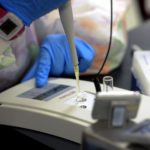UWF research associate readies lab for oil spill experiments
These days Fred Hileman, University of West Florida lecturer and analytical chemist, is busy conducting oil and water experiments at the university’s Center for Environmental Diagnostics and Bioremediation while he waits for real-life spill samples to come ashore in Pensacola.
The April 20 BP oil spill off the coast of Louisiana in the Gulf of Mexico has many scientists and researchers such as Hileman playing a game of watch and wait as the wind and water currents shift the direction of the yet uncontained spill by the hour. In the meantime, Hileman builds and tests experiments such as determining the value of placing hay on the surface of tainted water to soak up the oil.
Earlier this week, his lab featured a beaker of salt water and hay on one counter (agitating to simulate water movement) while a series of much smaller beakers representing the breakdown of a water-oil solution rested on another. Outside the lab building in the bright sunshine sat a shallow plastic tub of seawater and raw crude oil which Hileman is monitoring as the solution “weathers” — something the solution has been doing for more than 10 days.
A Monsanto/Solutia research veteran, Hileman has been at UWF as a research associate since 2008 conducting experiments, teaching and working with students in the lab. For the past couple of weeks, he’s been preparing for the inevitable – oil spill clean-up. He is laying the groundwork now for research work to be done by students once the oil makes its unwelcome arrival.
His work focuses on assisting the Center for Environmental Diagnostics and Bioremediation which takes biological research and applies it to environmental systems. “We are using some instrumentation to figure out how to do analysis right here at UWF rather than sending out samples for analysis so that the students get that experience,” he said.
Issues complicating his research include the absence of an oil sample from the spill site and the fact that very little sample material has washed up on shore in Pensacola. As an alternative, Hileman is using crude oil from an oil well in Jay as a substitute to test run his experiments.
Other issues complicating the process involve the spill’s constantly changing variables – the amount of oil in the spill continues to grow, the addition of dispersants in some areas, changing wind and water currents, the weather and even the passage of time. Also, since crude oil contains hundreds of compounds, researchers must choose which compound upon which to focus.
The spill has added a strong sense of urgency to the work Hileman does on a regular basis at UWF, but it is with mixed emotions he discusses the disaster’s impact. “If we can learn something from it, if we can learn and figure out better ways of being able to prevent a spill, better ways of cleaning up a spill and better ways of protecting marine life, then that is good.”
For more information, contact Hileman at (850) 857-6108 or e-mail fhileman@uwf.edu.
By Susie Forrester, University Marketing Communications


